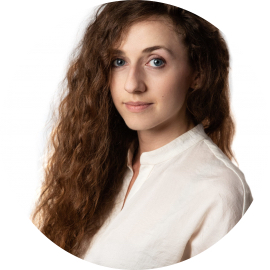
 awards
awards
Recognition for Institut Pasteur scientists
- Aleksandra Deczkowska, winner of the 2023 Joël Ménard Award for basic research
The Joël Ménard Awards go to physicians and/or scientists under the age of 40 who are conducting research on Alzheimer's disease and related disorders.
Every year, a prize of €4,000 is awarded in each of the following three fields:
• basic research
• clinical and translational research
• research in humanities and social sciences
The laureates are chosen on the basis of an entire body of research, a specific contribution or an ongoing research effort.
 In December 2023, Aleksandra Deczkowska, Head of the Brain-Immune Communication five-year group (G5), received the 2023 Joël Ménard Award for basic research in recognition of her research over many years on the immune system and its role in Alzheimer's disease. Aleksandra Deczkowska and her team are studying the communication mechanisms between nerve cells and the immune system in normal and pathological conditions, with the long-term aim of identifying novel therapeutic avenues for the prevention and/or treatment of Alzheimer's disease.
In December 2023, Aleksandra Deczkowska, Head of the Brain-Immune Communication five-year group (G5), received the 2023 Joël Ménard Award for basic research in recognition of her research over many years on the immune system and its role in Alzheimer's disease. Aleksandra Deczkowska and her team are studying the communication mechanisms between nerve cells and the immune system in normal and pathological conditions, with the long-term aim of identifying novel therapeutic avenues for the prevention and/or treatment of Alzheimer's disease.
- Laura Cantini and Eduardo Rocha, winners of 2024 CNRS medals
Each year, the CNRS recognizes the achievements of its talented researchers, engineers, technicians and administrative staff by awarding silver and bronze medals. In 2024, the CNRS awarded 48 bronze and 25 silver medals as an important mark of recognition for those whose work is advancing science.
 Laura Cantini, winner of a 2024 CNRS bronze medal
Laura Cantini, winner of a 2024 CNRS bronze medal
The bronze medal is given to researchers in the early stages of their career for research that has established them as specialists in their field. It recognizes the success of their research and encourages them to pursue their efforts. This year's bronze medal winners include Laura Cantini, Head of the Machine Learning for Integrative Genomics five-year group. Laura Cantini and her team work at the interface of Machine learning and genomics, developing methods exploiting the full richness and complementarity of the available single-cell data to ultimately derive actionable biological knowledge.
 Eduardo Rocha, winner of a 2024 CNRS silver medal
Eduardo Rocha, winner of a 2024 CNRS silver medal
The silver medal is awarded to scientists for the originality, quality and importance of research which has gained national and international recognition. Eduardo Rocha, Head of the Microbial Evolutionary Genomics Unit, is one of this year's 25 silver medal winners. Eduardo Rocha unraveled how the contribution of horizontal transfer to genome evolution depends on the interplay of mobile genetic elements with both the cell envelope and the immune systems of bacteria. His most recent work is elucidating the way many mobile genetic elements hijack the machinery of other mobile genetic elements to spread across microbial communities and how this impacts bacterial adaptation to antibiotics.